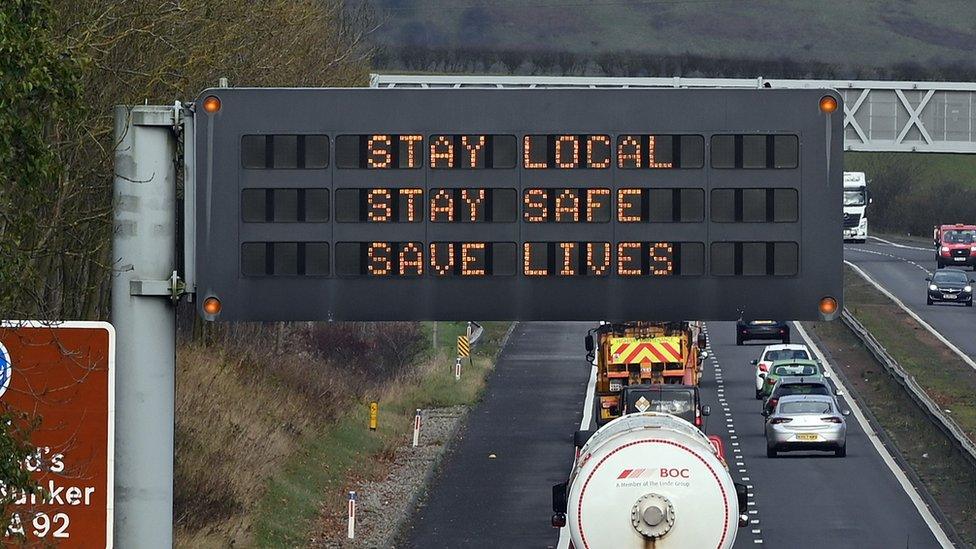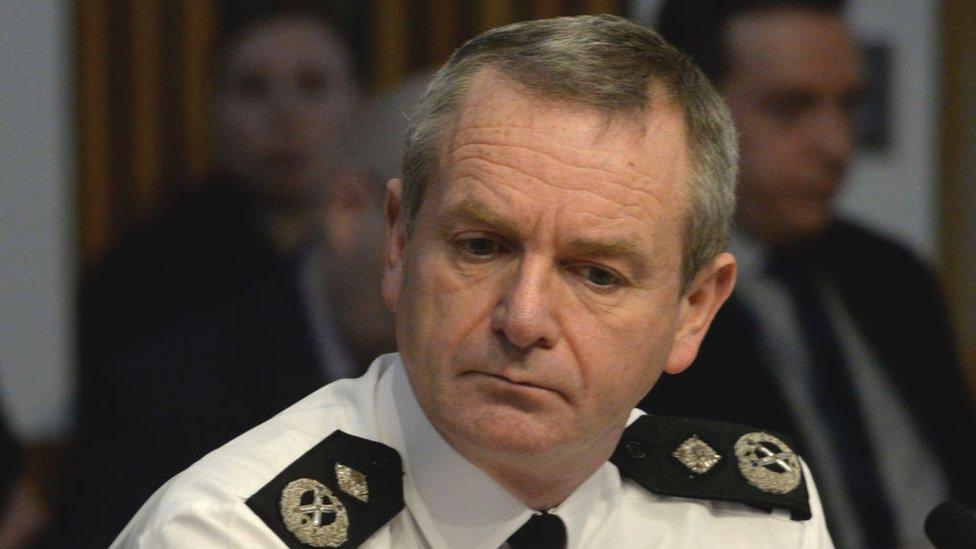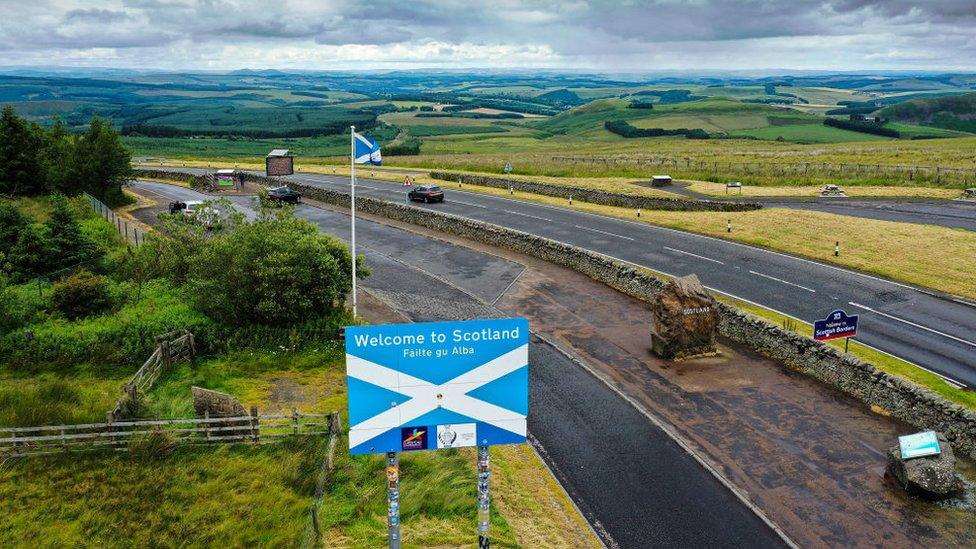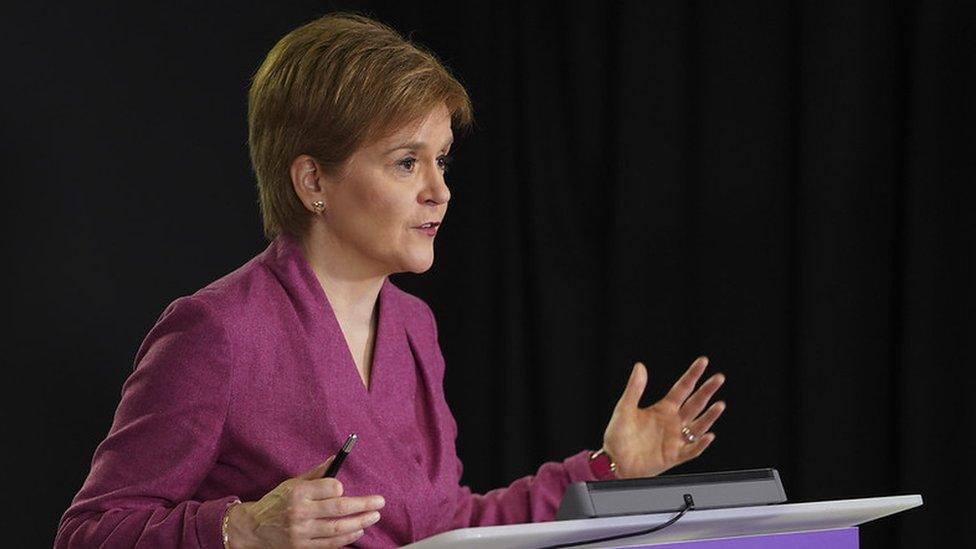Covid in Scotland: Police will investigate 'flagrant' breaches of travel ban
- Published
- comments

Police may investigate why people are travelling if their journey is suspected of breaching Covid-19 rules, Scotland's chief constable has said.
Travel between Scotland and the rest of the UK is currently prohibited in law for all but "essential" reasons.
Chief Constable Iain Livingstone has said he does not want to set up roadblocks or checkpoints.
But he said officers would carry out "some investigation" where they suspect a "flagrant breach" of the rules.
First Minister Nicola Sturgeon appealed to people to abide by travel restrictions "whether you are likely to be stopped or not", saying they are "imperative" to slowing the spread of the virus.
She said a new faster-spreading variant of Covid-19 poses a "very real" risk in Scotland and could run out of control "very quickly".
A legal ban on travel to and from Scotland from other parts of the UK came into force in November, and people are also prohibited from moving in or out of council areas which are in levels three or four - other than for "essential" reasons.
The cross-border restrictions will be maintained right through the festive period. The whole of the Scottish mainland is to move to level four from Boxing Day, meaning that blanket restrictions will be in force.
At the weekend, Police Scotland doubled the number of patrols in areas around the border as a deterrent against unnecessary travel.
Mr Livingstone said "high visibility" patrols were being carried out across Scotland to "prevent people travelling" - but said officers would not be setting up checkpoints.

The chief constable said policing travel restrictions was proving a "difficult challenge"
Mr Livingstone said he had been opposed to the idea of people having to carry identification papers or written authority to travel from the beginning of the pandemic, saying this would be "excessive and disproportionate".
But he said where vehicles were stopped, officers could carry out checks to see if the reasons given for travel were legitimate and covered by the exemptions set out in law.
The chief constable said policing the restrictions presented a "difficult challenge" for officers, but said "when required there will be a follow-through in terms of some investigation".
'Complete ignorance'
He added: "We will act in a fair and proportionate manner and seek to minimise the intrusion into private life - but where there is a flagrant breach we will act."
Asked for examples of when people could be stopped, Mr Livingstone said officers had pulled over a van in Glasgow after seeing the address of a scrap yard in Sunderland written on the side of it.
He said the occupants were in "complete ignorance" of the travel restrictions and had been issued with a fixed penalty notice fine.
Other reasons cited for why people could be stopped included having a broken tail light or driving erratically, or if the car was "very full" of people or luggage.

Travel between Scotland and the rest of the UK has been prohibited in law since November
The chief constable said officers would exercise "empathy and discretion", and that people with legitimate reasons would be allowed to continue on their way.
He added: "The key thing is not to think I might get away with it, or not - people should do the right thing, and think how they can make a contribution to stopping this virus spreading."
Mr Livingstone was speaking at Ms Sturgeon's daily coronavirus briefing, where the first minister reiterated the reasoning for the tightening of restrictions.
She said the consequences of not reacting swiftly to the threat of the new strain of Covid-19 could be "catastrophic", as it could quickly run out of control if no action was taken.
She said: "The key lesson of the last 10 months is that if we are complacent in the face of the virus, or if we act too slowly or wait for all of the information and data before making decisions, the virus can run away from us very quickly and the consequences can be very serious indeed."

Nicola Sturgeon said there were "no immediate concerns" about vaccine or medicine supplies despite border closures
News of the new strain of Covid has seen a series of countries around the world cut off arrivals from the UK, including across Europe and as far afield as India and Hong Kong.
Flights have been suspended, and France has temporarily shut its border with the UK - meaning no lorries or ferries can sail from the port of Dover.
Ms Sturgeon is to take part in emergency meetings with her own advisors and with leaders from across the UK to discuss the issue, which she said had "significant implications for businesses in Scotland".
However, she said there were "no immediate concerns" about supplies of medicine or Covid-19 vaccines.
And the first minister said supermarket bosses had assured her that they were "well stocked for Christmas" and that there was "no need for you to buy more than you usually would".

VACCINE: When will Scots get it?
NUMBERS: Five key figures to watch out for
LOCKDOWN: Six months that changed our lives
